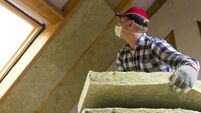Middle-class pursuit of Insta-friendly kitchens a distraction from the real problems with our homes

Orla McAndrew: 'Within a generation, we’ve gone from homes built on thrift and hand-me-downs to homes measured in quartz worktops and co-ordinated colour palettes.'
I have a new kitchen. It is bright, functional, photogenic, a joy to work in. As a chef, I needed the upgrade. But I also wanted it to look right. That’s the truth. In doing so, I’ve succumbed, at least partly, to the aesthetic pressure of modern Ireland.
And here’s the other truth: I had to make sacrifices to get here. It wasn’t frivolous spending. It was a calculated decision. Brands expect a certain polish when they partner with chefs or creators. They want recipes filmed against clean light and neutral backdrops.
















